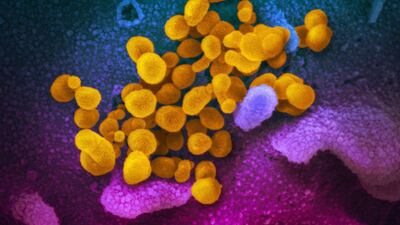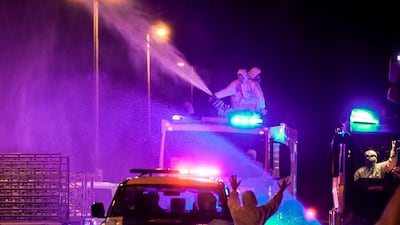Scientists in Dubai have uncovered the genetic blueprint of Covid-19, as part of a global effort to understand the virus and develop lifesaving treatments.
Researchers at the Mohammed bin Rashid University of Medicine and Health Sciences (MBRU) completed the first full genome sequencing of the virus to have taken place in the country, after analysing samples taken from a patient in Dubai.
Scientists in other parts of the world have carried out similar work and it is hoped, that by comparing genome sequences from different places, experts will develop an understanding of how the virus mutates and spreads from person to person.
The genetic work will also be invaluable in developing treatments and a vaccine, experts believe.
"Different strains of the virus might behave differently, and this information can also help us put together a picture of how it spreads in the community and throughout the world," Ahmad Abou Tayoun, associate professor of genetics at MBRU, told The National.
“We can identify the most prevalent strains and those which require the most surveillance.”
Dr Tayoun, who is also director of the Genomics Centre at Al Jalila Children’s hospital in Dubai, said the work could prove especially important in the UAE, given its position as a global travel hub.
“In the UAE, we are a meeting point between east and west, so there are multiple different entry points," he said.
"Different viruses have already been sequenced in China, the US and Europe, so it will be interesting to see where we fit in this globally. Do we have just one strain, or all of them?
“This work can also help us later on in developing vaccines and making them as effective as possible.”
The research is important as the genetic blueprint of a virus subtly changes as it mutates.
UK and German researchers have already completed early work on the “evolutionary paths” of the virus, and have found three distinct "variants" of Covid-19.
The specific strain found in the Dubai patient was most similar to one commonly associated with Illinois, USA, the researchers found.
However, sequencing is to be carried out on virus samples from 240 other patients in the UAE, who became infected at different times in the pandemic, to build a fuller understanding of the situation.
“Scientific research is a critical resource to inform strategies and actions against this virus,” Amer Sharif, Vice Chancellor of MBRU and head of Dubai’s Covid-19 Command and Control Centre, said.
“We are fortunate to have academic institutions that can join other sectors in Dubai in the fight against Covid-19.”
Genome sequencing has increasingly become an important tool for studying disease outbreaks.
The genome of the virus causing Covid-19 consists of 30,000 genetic “letters”.
Understanding which strain of the virus patients have can help scientists understand how it spreads as, for example, a group of patients found with identical strains are likely to be part of the same “cluster”.
The work is particularly important as the Covid-19 virus is believed to have originated in animals, and has only recently begun infecting humans.
Scientists believe the virus may still be adapting as part of its shift to infecting people and interacting with human immune systems.
Viruses will accumulate mutations which allow them, for example, to evade immune responses.
"If there is variability in key parts of the virus, it would be incredibly important for vaccine design," Paul Klenerman, a professor at the University of Oxford, recently told the BBC.
In separate studies, the genetics of different people are also being examined to see if this could explain why some coronavirus patients develop no or minor symptoms after becoming infected, while others become critically unwell or die.
In the UAE, the genome research will also look at whether different strains of the disease are more deadly.
“This development highlights the critical role of science and the scientific community in enhancing our capacity to fight emerging diseases,” said Professor Alawi Alsheikh-Ali, MBRU’s provost and a scientific adviser to Dubai authorities.
“We will also collect information on the severity of disease in our patients which can help us understand if different strains of the virus are associated with different levels of disease severity.”












